
2018 Sources Conference Keynote Speaker:
Ayoka Chenzira
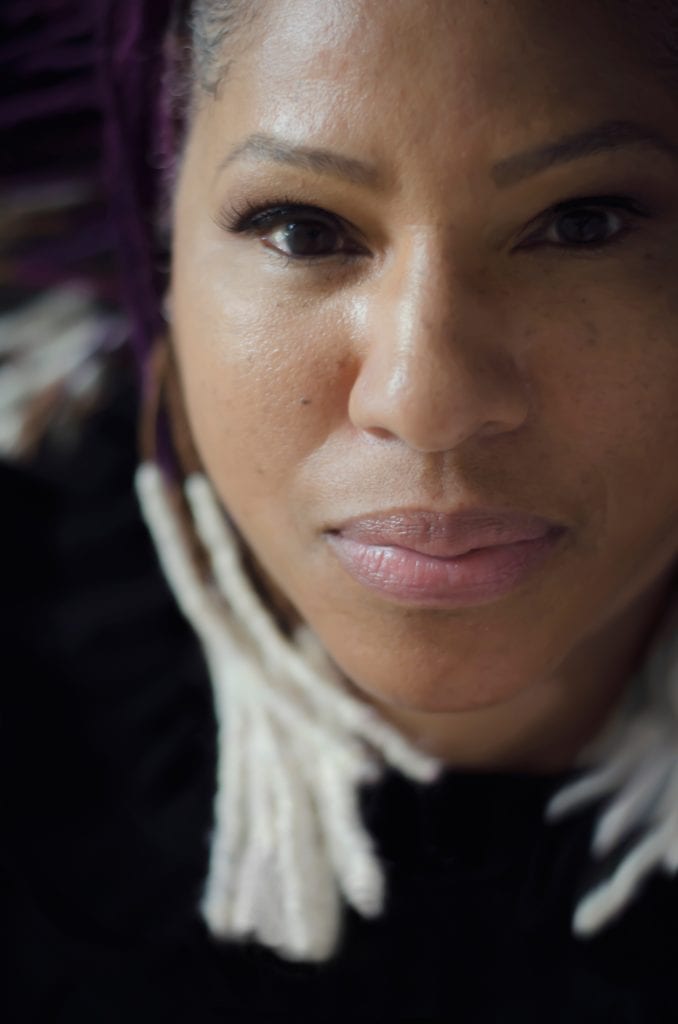 Photography by Dax Taylor
Photography by Dax Taylor
Ayoka Chenzira, PhD is a recognized pioneer in Black cinema with a lengthy and committed history to independent and experimental media making. An award-winning artist, she creates with the moving image through filmmaking, interactive digital media productions, and interactive theater productions.
Dr. Chenzira is a teaching artist at Spelman College where she serves as the Division Chair of the Arts and the Chair of the Department of Art & Visual Culture. She is a graduate of New York University (B.F.A. Film), Columbia University/Teachers College (M.A. Education) and is the first African American to earn a Ph.D. in Digital Media from the Georgia Institute of Technology.
Dr. Chenzira is perhaps best known for creating experimental films that challenge pervasive and harmful Black stereotypes and marginality. She is always experimenting with the moving image and considering new approaches to storytelling. This interest has taken various forms: creating animatiom that combines film, frame-by-frame video and computer generated imagery using Apple computer’s first MacIntosh desktop computer, embedding motion pictures into sculptural forms, or interactive cinema that combines the moving image with computer programming and is projected on to a building. However, these and other explorations are connected to her desire to centralize the voices of African American women, an audience whose stories she first heard and fell in love with in her mother’s beauty parlor. Click here to learn more about Dr. Chenzira.

-

Is Gentrification the New School Pushout?: A Conversation with Community about the Intersection of Urban Education Reform and Gentrification
Thais Council, Rebecca Graham, Shaeroya Earls, Shakale George, Marlyn Tillman, Georgia State University, Gwinnett STOPP
This presentation will serve as a continuation of conversations that have been conducted in an effort to include voices of those most impacted by urban education reform in Atlanta. Our participatory action research team, comprised of urban education teachers, conducted several community listening sessions in Pittsburgh and Washington Park Atlanta to determine if charter schools were keeping their promise to the neighborhoods and children they pledged to “rescue.” During this presentation, we will highlight several themes that emerged from data collected during the community listening sessions and invite conference participants to add their voices to “The New School Pushout” conversation.
-
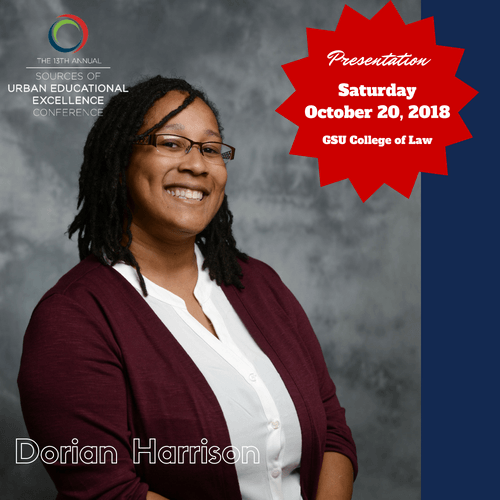
Inviting the experts: A case study of an after school program
Dorian Harrison, Belmont University
This ethnographic case study draws upon understandings of ideologies and curriculum within an after school program. Data was collected across a year. Findings revealed how interpretations of curriculum by staff positioned youth as experts on their own needs and experiences.
-

Growing a Garden of Possibilities: Cultivating Collective Understanding, Climate and Community in Urban Schools
Cheryl Jamison, Coretta Scott King Young Women's Leadership Academy/Mercer University Through the lens of single-sex classes and schools as an alternative to the traditional structure, participants will question traditional schooling, and explore practical strategies that involve students, parents and community stakeholders to cultivate positive school culture and climate that transforms learning spaces and supports improved student academic outcomes.
-

Re-Defining Black Males Success – From College to Career: Narratives from Recent Black Male College Graduates
George Greenidge, Joseph Peterson, Deirdre Royster, Illya Davis, Michael Williams, Said Sewell, Jeffrey Coleman, Georgia State University, Morehouse College
A recent 2018 study from Researchers at Harvard University, Stanford University and the Census Bureau concluded “that Black boys raised in America, even in the wealthiest families and living in some of the most well-to-do neighborhoods, still earn less in adulthood than white boys with similar backgrounds, according to a sweeping new study that traced the lives of millions of children.”
White boys who grow up rich are likely to remain that way. Black boys raised at the top, however, are more likely to become poor than to stay wealthy in their own adult households.
With this new study’s conclusion, what tools and networks can we build in urban education, the college level and throughout society to challenge and support our young black men to become successful economically in their life and their careers.
This panel of young black Georgia State University and Morehouse graduates will explore their own narratives of completing college and entering the job market, and the obstacles that they continue to face to become economically self-sufficient in the United States of America.
-

Community-based Praxis: The Atlanta Schools Critical Education Network for Distinction (ASCEND)
Jacob Hackett, Nadia Behizadeh, Ayinde Summers, Maurice Hobson, Jonnie Ford, Georgia State University
The Atlanta Schools Critical Education Network for Distinction (ASCEND) is a recent research partnership between Georgia State’s Department of Middle & Secondary Education and African-American Studies, Project South, and Dr. MLK Jr. Middle School to support the curricular integration of social-justice themes for Social Studies and Language Arts teachers.
-

Growing as they give: Teacher development through cultural community wealth contributions
Sonia Howard, Natalie King, Georgia State University
From the findings of a study about STARS, a STEM summer program developed within a community of color, we will share some of the stories of the cultural capital teachers shared and how they grew alongside their students from the cultural community wealth inculcated within the STARS STEM program.
-

Music. Does it matter? This could be YOUR community's gateway to a world of billions.
Ryan Kilgore, Adelia Johnson, ShaK Jones. LaToya Brooks, Cedric Young, Billy Johnson, Kilgore Foundation
Witnessing an industry from the top of its food chain, down to the massive budget cuts of programs, brings me to this questions: Does it matter that the survival of music, a universal language of the world, is being abandoned and ignored?
-

Teach me football, I will teach you soccer. Multicultural cooperation between co-teachers
Bailey Kirk, Aneta Galazka, Georgia State University
The focus lately has been on the diversity of students within urban schools, but how can the diversity of teachers be used as teaching tools? In this session, we are discussing how we use our personal backgrounds within the classroom and how your culture can be used in the classroom.
-
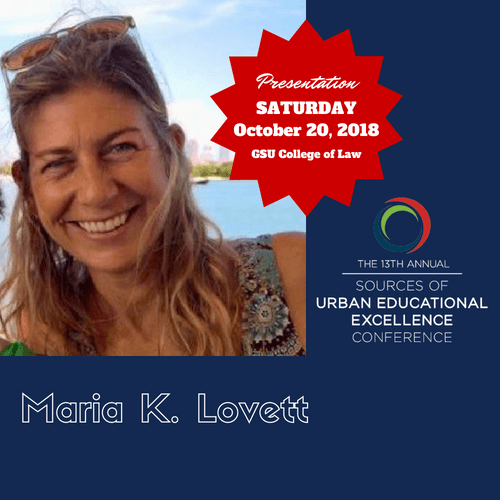
South Florida Alliance of "We the People – Math Literacy for All"
Maria Lovett, Scott Fiske, Paola Calcado, Mark Howard, Laverta, Florida International University
A panel of two principals, mathematics teacher, FIU professor, and student will tell their narratives about the building of a local alliance, whose mission is to transform math instruction for disenfranchised students in high schools in the 6th largest district in the nation.
-
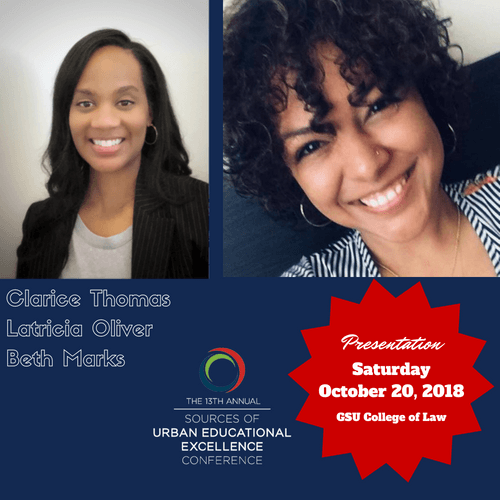
Educating for Increased Awareness and Action through Critical Composition Pedagogy in an Urban Middle School
Beth Marks, Latricia Oliver, Charity Gordon, Clarice Thomas, Hiedi Godwin, Nadia Behizadeh, Kennesaw State University
Aim is increasing criticality of instruction in urban, public middle schools and making visible both how teachers enact critical composition pedagogy (CCP) in English language arts (ELA) classrooms and why. CCP’s major tenets are historicity, dialogism, problem-posing, emancipation, and praxis. Factors which enable or impede social justice instruction are examined.
-

#BlackTeachersMatter: A Call for Collective Learning and Liberatory Pedagogy
Jillian Ford, Precious Brown, Whitney Lott. Cierra Cooper. Tamera Tillman, Renard Snell, Kennesaw State University
The purpose of this session is to highlight the lived experiences of Black pre-service teachers who are members of #BlackTeachersMatter. Undergraduate students will lead a discussion about how their processes of engaging collectively is key in their journeys of thinking more critically about their experiences in order to become more informed and engaged in liberatory pedagogy.
-
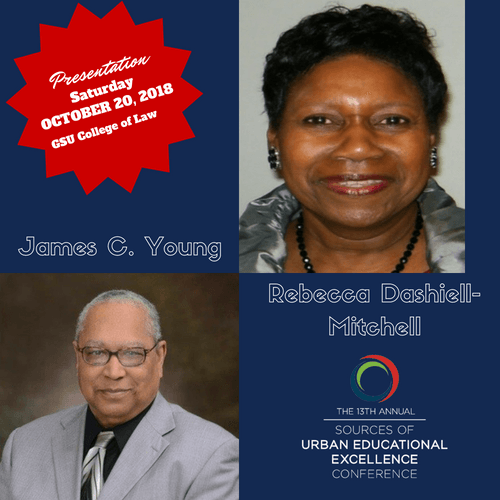
A Comparative Analysis of an EPP at an HBCU versus TWI – What are the Defining Variables?
James C. Young, Rebecca Dashiell-Mitchell, Clark Atlanta University
As an HBCU – Historically Black College or University- Clark Atlanta University has a 150 year history of preparing teachers for African American learners. Its conceptual framework expands beyond traditional knowledge, skills, and dispositions versus a TWI. Is there a difference? What are the defining variables?
-

Unpacking Serving the Unserved: Opportunities and Challenges for Urban Student and Community Programming
Amanda Wilkerson, Deshawn Chapman, Shalander Samuels, Whitney Watkins, University of Central Florida
In some respects, incorporating visible and transformative practices regarding Urban Student populations and the communities in which they live involves hard work, dedication, and commitment. As professionals serving in respective roles, Director of a Trio Service Program, Secondary Education Urban School Instructor, Director of Post-Secondary Preparation Program for Urban Foster Students, and Project Director for Urban Teaching Initiatives we seek to, collectively, create dynamic programing experiences to best serve urban populations. Yet a main determinant to confront the intricacies of urban students and their communities include making connections and building relationships, given that widespread collaborative efforts are paramount for advancing programming initiatives. As a result, this panel discussion will focus on exploring best programming practices. Panelists will bring visibility to central concerns regarding building and sustaining important urban student programing from the perspective of new administrators working, meeting goals, and making progress in their respective areas.
-

Humanization and the Language of Pedagogical Love: Making Paulo Freire Visible in P-12 Urban Education
Charmaine Smith-Campbell, Mercer University
This theory to practice narrative makes Freire’s humanizing approach grounded in pedagogical love visible. It is cognitively uplifting, knowledge creating, and transformative; emerging from critical social justice traditions of Horkheimer’s Frankfurt School of theorists. It empowers and educates all learners—including urban students and teachers-as-learners in its two-way educational approach.
-
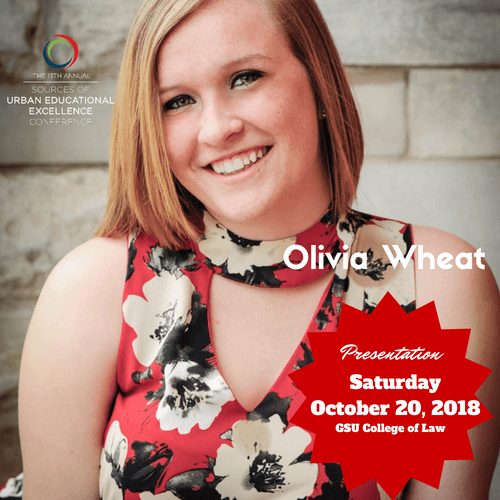
Oscillating Visibility: Facilitating the Success of a Secondary Student with Autism in a Summer Program
Olivia Wheat, Georgia State University
Follow one teacher’s journey toward providing appropriate support for a high school student with autism, handling major issues that arose along the way, and considerations for continuing to expand ways in which educational spaces both in and out of formal school settings can be designed to foster inclusion.
-

Not Just Another Book Report: Doing Confianza from Reading Funds of Knowledge
Gertrude Tinker-Sachs, Ewa McGrail, Elizabeth Sanchez.
We will discuss a university Directed Reading Course using the text Funds of Knowledge. The course required reading, reporting and also doing and making visible the funds of knowledge inherent in a local community site. The road to building confianza between African Americans and Latinx in Atlanta will be discussed.
What’s happening before the Conference?
Join us at our 3 outstanding pre-conference events! All Sources for Urban Educational Excellence Conference events are open to the public.
A Conversation with Dawud Anyabwile: Drawing From the Soul @ The Auburn Avenue Research Library
Wednesday October 17, 2018 at 6:30pm
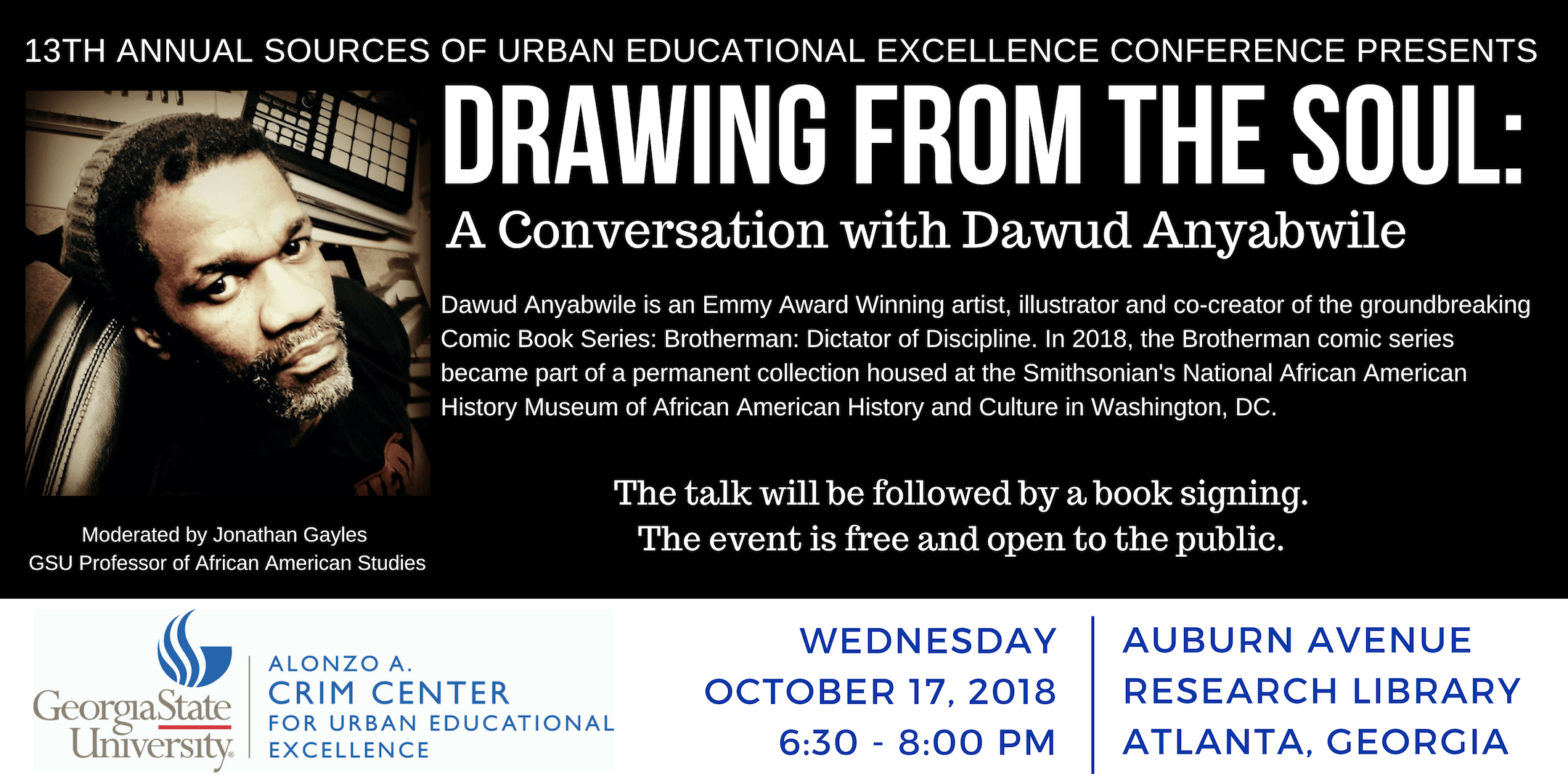
Film Screening and Panel Discussion:
Thursday October 18, 2018 at The Auburn Avenue Research Library
This event is free and open to the public.

Join us at the Auburn Avenue Research Library (101 Auburn Ave NE, Atlanta, GA 30303) on October 18th, 2018 for the screening of the film, BACKPACK FULL OF CASH. This documentary film “explores the growing privatization of public schools and the resulting impact on America’s most vulnerable school populations.” The goal of this event is to move from “good/bad” charter and school choice conversations to more complex discussions related to equitable access to quality education and the role of public education in our democracy.
The screening will be followed by a panel discussion facilitated by Georgia State University (Georgia State University) faculty member, Jacob Hackett. Panelist include Jason Esteves (Atlanta Public Schools Board member), Nina Gilbert (educator and founder of Ivy Preparatory Academy), Tiffany Green-Abdullah (founder of The Community Academy for Architecture and Design), Atiba Mbiwan (Associate Director at the Zeist Foundation), and Eli Velez (Managing Director of Youth Programs at the Latin American Association).
This event is organized by the Alonzo A Crim Center for Urban Educational Excellence and supported by The Auburn Avenue Research Library, The Baton Foundation, Georgia State University CREATE Residency Program, Georgia State University Department of Early Childhood and Elementary Education, Georgia State University Department of Educational Policy Studies, Georgia State University Department of Middle and Secondary Education, and Joyce King (Benjamin E. Mays Chair for Urban Teaching, Learning, and Leadership at Georgia State University).
Historical Bike Tour: Friday October 19, 2018 @ 3-5pm
SPACE IS LIMITED! Only 15 slots left!
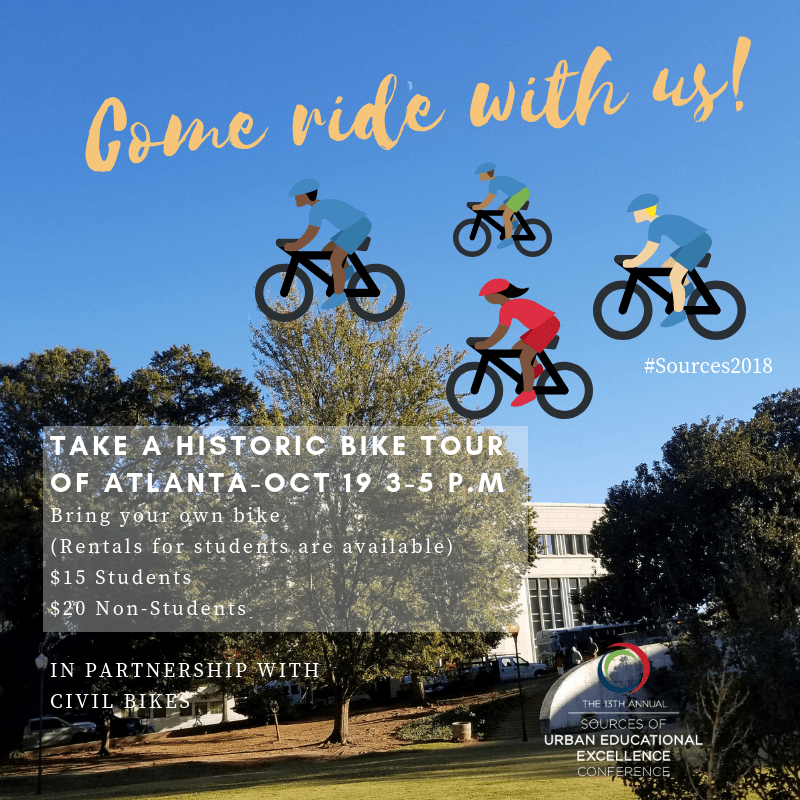
Join us for a 2-hour/3-5 mile tour (including initial safety discussion) on Friday, Oct. 19th from 3-5pm. We will bike to stops that are related to various times of activism and action by the Atlanta student movements and a labor strike, the 1906 Race Riot that deepened the color line and further stratified the city by race, and one of the many working to middle-class women reformers that brought about major changes. Our tour will engage history and make connections to present-day. This is a conversation about place, people, and history where shared knowledge, thoughts and feelings are valued. Our stops will be in the Fairlie-Poplar District, Five Points, Woodruff Park, and Auburn Avenue area.
It will be BYOB (bring your own bike), but we’ll meet by the Relay Bikes station in Troy Davis/Woodruff Park. Folks can check out a bike there if they don’t have one or can’t get their bike downtown. Georgia State University students/staff/faculty can rent bikes from Georgia State University’s “Touch the Earth” program. At the end of the tour, we’ll return bikes to Troy Davis Park and then gather at Alma Cochina just after 5pm on Peachtree St for drinks, snacks, and fellowship.
Cost and payment: The cost of this tour is: $20 for community members and $15 for students. To register and pay for this event, click here. For more information contact Dana: dsalter@gsu.edu
About the Theme

“It’s About Visibility: Narratives, Critiques, and Collective Understanding in Urban Education.” We are asking people to ponder the role of visibility in urban education. For the purposes of this conference, we are expanding the definition of visibility to include a focus on action, specifically about making the larger local-meets-national-meets-local conversations happening in urban education visible to all involved. At the same time, visibility-as-action gives policymakers and advocates access to direct narratives so that they can take informed actions toward sustainable solutions. #Sources2018
About Sources
What is Sources?
The 13th Annual Sources of Urban Educational Excellence Conference, scheduled for Oct. 20 at Georgia State University’s College of Law (85 Park Place N.E., Atlanta), will bring together educators, graduate students, activists, policy makers, artists, business and industry members, and community workers for a series of panels, presentations and discussions on the conference’s theme, “
It's About Visibility!: Narratives, Critiques, and Collective Understanding” This conference is hosted by the
Alonzo A. Crim Center for Urban Educational Excellence at Georgia State University.
We look forward to seeing you on October 20, 2018!
When is Sources?
The conference will be held October 20, 2018 at the Georgia State University College of Law.
What is the cost to attend?
The cost to attend Sources is $35. The cost include: registration, breakfast, lunch and dessert and post-conference happy hour with live music
Click here to register:
Link to Register
What is happening before the conference?
The Sources of Urban Educational Excellence Conference invites you to join us for a week of pre-conference events, beginning on October 15, 2018. These events provide a space to mingle, collaborate and connect in preparation for the conference. Each event is open to the public.
On October 19, 2018 join us and Civil Bikes for a historical bike tour around the city of Atlanta, paying for this event can be covered in your registration.
Parking and Directions
The 13th Annual Sources of Urban Educational Excellence Conference will be held at Georgia State University’s College of Law, 85 Park Place N.E., Atlanta.
On Saturday: FREE parking is available in the G Deck on Georgia State University’s campus. !! The Central Street Entrance is the only entrance available. This parking deck is open from 7:00 am – 9:30 pm on Saturday and 11:00 am – 9:30 pm on Sunday.
Once you park in the G Deck, you will walk 2 blocks over to Park Place.
On Sunday: $7.00 parking is located in T Deck on Georgia State University’s campus. The entrance to T-Deck is located on 43 Auburn Avenue, Atlanta, Georgia, 30303. The G Deck on Georgia State University’s campus parking deck is open from 11:00 am – 9:30 pm on Sunday.
Who can I contact?
Please direct all conference inquiries to Dana E. Salter. She can be contacted at dsalter@gsu.edu or (404) 413-8072.
 Photography by Dax Taylor
Photography by Dax Taylor




















